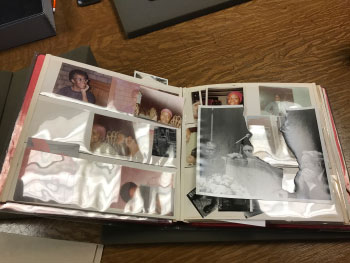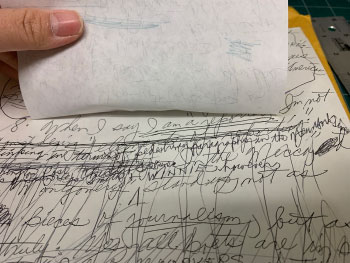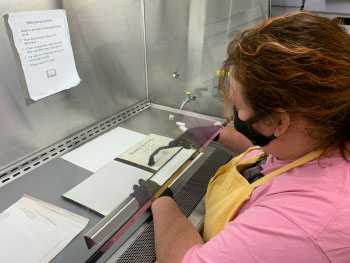Grant Spotlight | April 26, 2022
Share ThisApril 26, 2022

Sharing the Voice of Gwendolyn Brooks
University of Illinois is conserving a collection that includes personal writing, photographs, and scrapbooks
“Gwendolyn Brooks was a fascinating person, and her papers really reflect her personality—many of the documents have scribbled notes and show the creative process of her as a poet and a creative person.” — Jennifer Hain Teper, Principal Investigator, Gwendolyn Brooks Papers Project, University of Illinois at Urbana-Champaign
Gwendolyn Brooks is widely recognized as one of the greatest American poets of the 20th century. As poet laureate of Illinois for more than 30 years, she was the first African American to win a Pulitzer Prize. Throughout her successful career, Brooks remained committed to supporting young writers in her community and was a leader in the Black Arts movement in Chicago in the 1960s.
The University of Illinois Rare Books and Manuscript Library acquired her literary archives—called the Gwendolyn Brooks Papers—with a commitment to highlighting her work as an important part of American poetry history. To preserve this collection, the library is using funds from a Save America’s Treasures grant award, administered by the Institute of Museum and Library Services.
Preserving Every Piece

Without this funding, the library would have slowly addressed the conservation needs of some of Brooks’ collection, but would not have been able to programmatically conserve the collection or undertake the digitization aspect of the project.
Under the leadership of the grant’s Principal Investigator Jennifer Hain Teper, the project team is stabilizing, cleaning, repairing, and digitizing the collection, which consists of more than 500 boxes filled with manuscripts, drafts, correspondence, scrapbooks, clippings, recordings, photographs, awards, artifacts, notebooks full of personal notes and lists, and several homemade chapbooks of handwritten early poetry.
“The collection holds unrivaled content that illuminates Brooks’ creative process, personality, and literary career,” Teper said.
The goal is to make the Gwendolyn Brooks Papers more accessible to researchers, both through extensive digitization and metadata creation as well as through conservation treatment of fragile and damaged materials. In addition, the project will allow smaller portions of the collection to receive custom protective enclosures while vulnerable audio-visual content will be migrated to digital format.
Handling with Care
Teper explained that much of Brooks’ unpublished manuscript material has been heavily handled, is on poor quality paper, and has been stored in less-than-ideal conditions before its acquisition by the library. This has left the most valuable materials torn, dirty, covered in pressure-sensitive tape, and often too fragile for safe handling in its current state.
“That’s why this project will address both the physical concerns related to the materials and also create enhanced, searchable access via digital surrogates and item-level metadata,” Teper said.

Since Teper and her team started digging into the project, the ability to problem-solve has been key. Some of the materials in the collection present significant challenges for both digitization and conservation—which is actually due to use of tape by Brooks herself. Since the tape is part of the artifact and how it was used by Brooks, the project team wants to preserve it, which makes working around it difficult at times—particularly if it’s obstructing other content.
Another challenging piece has been the “red album,” as Teper and her team have come to call it—a traditional photograph album with plastic pages and pockets for photos.
“Unfortunately, the pockets are over-filled with photographs—some that are too large to fit in the pockets. Maintaining original order is nearly impossible,” Teper said. “How to digitize this as an object, as well as all of the individual images, and how to then conserve the album to make sure that the photographs are safer to handle has been an enormous challenge.”
Despite these hurdles, once Teper and her team are finished, the materials will be much more broadly available and searchable by researchers and those who wish to learn more about the compelling voice of Gwendolyn Brooks.
About the Project
Grant Project Name: Gwendolyn Brooks Papers Project
Grant Log Number: ST-248586-OMS-20
Year Awarded: 2020
Recipient: University of Illinois at Urbana-Champaign
Project Contact:
Jennifer Hain Teper
Principal Investigator, Gwendolyn Brooks Papers Project
University of Illinois at Urbana-Champaign
jhain@illinois.edu
Website:https://www.library.illinois.edu/rbx/tag/gwendolyn-brooks/
